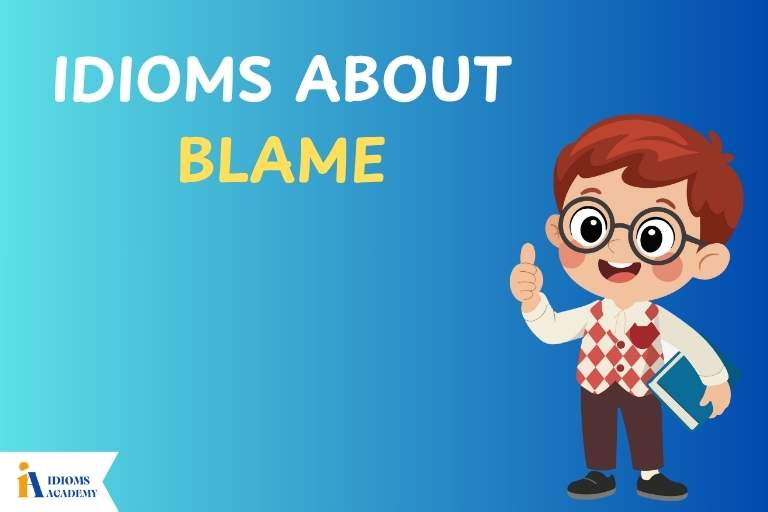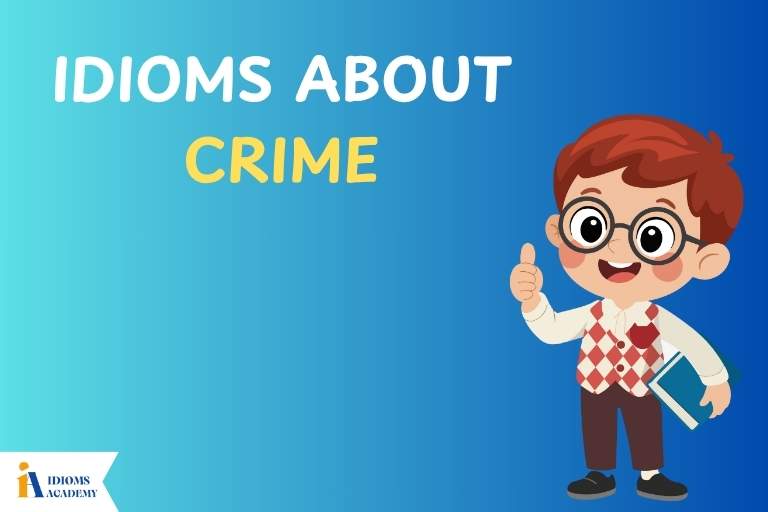Enemies are not always people we fight with using fists. Sometimes, they are just people who don’t like us, or people we don’t get along with. Even in stories and cartoons, enemies can show up. They make the story more exciting and help us learn about being strong and smart.
People have made fun or smart phrases to talk about enemies. These phrases are called idioms. Idioms are not meant to be taken word-for-word. They have special meanings. In this article, you’ll learn some of these idioms, what they mean, and how to use them in real life. They can help you speak and write better, just like authors and teachers do.
Idioms About Enemies
1. Bury the hatchet
Meaning: To make peace with someone after a fight
Example Sentence:
• Jake and Leo buried the hatchet and played basketball again.
• The two neighbors buried the hatchet after their argument.
Other ways to say: Make peace, settle differences
Fun Fact/Origin: This phrase comes from Native American traditions where people would bury a real hatchet to show peace.
Usage: Used when people stop being enemies and become friends again.
2. A wolf in sheep’s clothing
Meaning: Someone who seems kind but is actually mean
Example Sentence:
• That boy seemed nice, but he was a wolf in sheep’s clothing.
• Watch out for her—she’s a wolf in sheep’s clothing.
Other ways to say: Fake friend, tricky person
Fun Fact/Origin: This comes from old stories where wolves dressed like sheep to sneak into the flock.
Usage: Used when someone pretends to be friendly but isn’t.
3. Add fuel to the fire
Meaning: To make a bad situation worse
Example Sentence:
• Yelling at him only added fuel to the fire.
• Spreading rumors adds fuel to the fire.
Other ways to say: Make it worse, stir things up
Fun Fact/Origin: This comes from how fire grows bigger when you add more fuel.
Usage: Used when someone makes a fight or problem worse.
4. Fight like cats and dogs
Meaning: To argue or fight a lot
Example Sentence:
• The twins fight like cats and dogs.
• My cousins fight like cats and dogs during holidays.
Other ways to say: Argue all the time, always clash
Fun Fact/Origin: Cats and dogs are known to not get along, which led to this phrase.
Usage: Used to describe people who argue often.
5. Burn bridges
Meaning: To end a friendship or connection in a bad way
Example Sentence:
• He burned bridges with his team by quitting suddenly.
• Don’t burn bridges with your coach—you might need help later.
Other ways to say: End badly, destroy a connection
Fun Fact/Origin: Comes from battles where bridges were burned to stop return.
Usage: Used when someone ends a relationship badly.
6. Get under someone’s skin
Meaning: To really bother or annoy someone
Example Sentence:
• Her teasing gets under his skin.
• That loud chewing got under my skin during lunch.
Other ways to say: Annoy, bug someone
Fun Fact/Origin: It means something is so annoying it feels like it’s inside you.
Usage: Used when someone bothers you a lot.
7. Eye for an eye
Meaning: To hurt someone back after they hurt you
Example Sentence:
• He believed in an eye for an eye and took the ball back.
• She said it’s only fair—eye for an eye.
Other ways to say: Get revenge, payback
Fun Fact/Origin: This comes from an old law saying if someone hurts you, you can do the same back.
Usage: Used when someone wants to get even.
8. Hold a grudge
Meaning: To stay mad at someone for a long time
Example Sentence:
• She held a grudge after the prank.
• Don’t hold a grudge—it’s better to forgive.
Other ways to say: Stay mad, not forgive
Fun Fact/Origin: A grudge is an old word for feeling angry for a long time.
Usage: Used when someone doesn’t let go of being mad.
9. Stab in the back
Meaning: To hurt a friend secretly
Example Sentence:
• He stabbed me in the back by telling my secret.
• That move felt like a stab in the back.
Other ways to say: Betray, double-cross
Fun Fact/Origin: Comes from sneaky attacks in old times.
Usage: Used when someone you trust hurts you.
10. Cold shoulder
Meaning: To ignore someone on purpose
Example Sentence:
• She gave him the cold shoulder at lunch.
• He felt bad when they gave him the cold shoulder.
Other ways to say: Ignore, shut out
Fun Fact/Origin: Giving someone your shoulder meant turning away from them.
Usage: Used when someone is being unfriendly on purpose.
11. Enemy of my enemy is my friend
Meaning: Two people team up because they share the same enemy
Example Sentence:
• They didn’t like each other, but they worked together because of a shared enemy.
• The enemy of my enemy became my friend during the school contest.
Other ways to say: Join up against someone, work together
Fun Fact/Origin: This idea comes from old battles when people teamed up just to defeat a bigger threat.
Usage: Used when people join forces because they dislike the same person.
12. Keep your friends close and your enemies closer
Meaning: Watch your enemies carefully
Example Sentence:
• He sat near his rival to see what he was planning—keeping enemies closer.
• She played nice, but only to keep her enemies closer.
Other ways to say: Stay alert, watch out
Fun Fact/Origin: This phrase became popular through movies but is older than that.
Usage: Used when someone watches their enemy very closely.
13. Cross swords
Meaning: To get into a fight or argument
Example Sentence:
• They crossed swords during the debate.
• He crossed swords with his teammate over the game plan.
Other ways to say: Argue, fight
Fun Fact/Origin: Comes from sword fighting in battles or duels.
Usage: Used when people argue or fight.
14. At each other’s throats
Meaning: Constantly arguing or fighting
Example Sentence:
• The two boys were at each other’s throats all recess.
• My siblings are always at each other’s throats.
Other ways to say: Fighting nonstop, always clashing
Fun Fact/Origin: This phrase shows how angry people seem ready to attack.
Usage: Used when people are always fighting.
15. Show your true colors
Meaning: To show who you really are, often in a bad way
Example Sentence:
• He showed his true colors when he cheated.
• After the fight, she showed her true colors.
Other ways to say: Reveal your real self, show your true face
Fun Fact/Origin: From ships showing their flags to reveal who they really were.
Usage: Used when someone’s actions show their real character.
16. Have it out for someone
Meaning: To want to harm or upset someone
Example Sentence:
• The coach had it out for the new player.
• It felt like the teacher had it out for me.
Other ways to say: Target someone, be against
Fun Fact/Origin: Comes from the idea of aiming at someone.
Usage: Used when someone seems to dislike another on purpose.
17. Get even
Meaning: To take revenge
Example Sentence:
• He got even by beating his rival at the race.
• She wanted to get even after the prank.
Other ways to say: Pay back, take revenge
Fun Fact/Origin: Getting “even” means making things fair again.
Usage: Used when someone wants to make things fair by revenge.
18. Push someone’s buttons
Meaning: To annoy someone on purpose
Example Sentence:
• He keeps pushing her buttons by teasing her.
• My brother knows how to push my buttons.
Other ways to say: Bother, pick on
Fun Fact/Origin: Comes from the idea of pressing buttons to trigger a reaction.
Usage: Used when someone knows what annoys another.
19. Bad blood
Meaning: Angry feelings between people
Example Sentence:
• There’s bad blood between those two teams.
• They haven’t spoken in years because of bad blood.
Other ways to say: Dislike, tension
Fun Fact/Origin: This term was used to describe old family feuds.
Usage: Used when people have a long-standing fight.
20. Throw someone under the bus
Meaning: To blame someone to protect yourself
Example Sentence:
• He threw me under the bus to save himself.
• She got in trouble after her friend threw her under the bus.
Other ways to say: Blame unfairly, betray
Fun Fact/Origin: This is a newer phrase meaning someone gets hurt to protect another.
Usage: Used when someone is blamed by a friend.
21. Turn the tables
Meaning: To change a bad situation into your favor
Example Sentence:
• He turned the tables by winning the rematch.
• She turned the tables during the spelling bee.
Other ways to say: Flip the situation, take control
Fun Fact/Origin: This comes from board games where players would switch spots.
Usage: Used when someone gains control over an enemy.
22. Settle the score
Meaning: To get revenge or even things out
Example Sentence:
• He wanted to settle the score after losing last time.
• She settled the score by winning the final game.
Other ways to say: Make it even, get payback
Fun Fact/Origin: This comes from keeping scores in games or fights.
Usage: Used when someone wants to make things fair.
23. Bite back
Meaning: To respond to an insult or attack
Example Sentence:
• He bit back after being called names.
• She didn’t stay quiet—she bit back.
Other ways to say: Talk back, respond
Fun Fact/Origin: Comes from the idea of an animal biting when hurt.
Usage: Used when someone fights back with words.
24. A snake in the grass
Meaning: A sneaky, untrustworthy person
Example Sentence:
• Watch out—he’s a snake in the grass.
• I didn’t expect her to be a snake in the grass.
Other ways to say: Sneaky person, fake friend
Fun Fact/Origin: Comes from snakes hiding and attacking suddenly.
Usage: Used when someone betrays trust secretly.
25. Raise hackles
Meaning: To make someone angry
Example Sentence:
• That rude comment raised my hackles.
• His tone raised hackles at the meeting.
Other ways to say: Make mad, stir anger
Fun Fact/Origin: Comes from how dogs raise hair on their backs when angry.
Usage: Used when someone makes others upset.
26. Give someone a taste of their own medicine
Meaning: To treat someone the way they treated others
Example Sentence:
• She gave the bully a taste of his own medicine.
• He teased her back to give her a taste of her own medicine.
Other ways to say: Fight back, do the same
Fun Fact/Origin: Comes from old medicine sayings, showing fairness.
Usage: Used when someone gets treated the same bad way they act.
27. Lock horns
Meaning: To strongly argue or fight
Example Sentence:
• The boys locked horns over who won the race.
• The teams locked horns during the game.
Other ways to say: Argue, clash
Fun Fact/Origin: Comes from how animals like goats fight by locking horns.
Usage: Used when people argue with force.
28. A thorn in someone’s side
Meaning: Someone who causes constant trouble
Example Sentence:
• He’s been a thorn in my side all week.
• The rival team is a thorn in our side.
Other ways to say: A problem, a pest
Fun Fact/Origin: Comes from the pain of having a thorn stuck in your side.
Usage: Used when someone keeps causing problems.
29. Two-faced
Meaning: Someone who acts nice but talks bad behind your back
Example Sentence:
• I don’t trust him—he’s two-faced.
• She’s friendly, but she’s really two-faced.
Other ways to say: Fake, backstabber
Fun Fact/Origin: Comes from showing one face to you and a different one to others.
Usage: Used when someone pretends to be nice but isn’t.
30. Go behind someone’s back
Meaning: To do something secretly that hurts someone
Example Sentence:
• She went behind my back and told the teacher.
• He went behind his friend’s back and changed teams.
Other ways to say: Betray, act secretly
Fun Fact/Origin: Means doing something without the person knowing.
Usage: Used when someone secretly does something wrong.
Quiz: Idioms About Enemies
Instructions: Read each question and the answer choices carefully. Pick the letter that best matches the meaning of the phrase or expression.
Question Key
1. What does “stab in the back” mean?
A) To help someone secretly
B) To hurt a friend secretly
C) To surprise someone with a gift
2. If someone “adds fuel to the fire,” what are they doing?
A) Making things better
B) Making a problem worse
C) Starting a fun story
3. What does it mean to “bury the hatchet”?
A) To hide something dangerous
B) To play with tools
C) To stop fighting and make peace
4. If you “hold a grudge,” what does that mean?
A) You forget things easily
B) You stay mad at someone for a long time
C) You cheer someone up
5. What does “get even” mean?
A) To balance on a beam
B) To win a prize
C) To take revenge on someone
6. What does “a wolf in sheep’s clothing” describe?
A) Someone who loves animals
B) A person who pretends to be nice but is not
C) A sheep that gets lost
7. If you “throw someone under the bus,” what are you doing?
A) Blaming someone to save yourself
B) Giving someone a ride
C) Playing a fun game
8. What does “cold shoulder” mean?
A) Wearing a cold jacket
B) Being friendly
C) Ignoring someone on purpose
9. If two kids are “at each other’s throats,” what are they doing?
A) Sharing a snack
B) Fighting or arguing a lot
C) Laughing together
10. What does “snake in the grass” mean?
A) A fun game to play
B) A dangerous pet
C) A sneaky, untrustworthy person
11. If someone is “pushing your buttons,” what are they doing?
A) Playing a video game
B) Annoying you on purpose
C) Helping you clean up
12. What does it mean to “go behind someone’s back”?
A) To follow them closely
B) To do something fun with them
C) To do something secretly that may hurt them
Answer Key
- B) To hurt a friend secretly
- B) Making a problem worse
- C) To stop fighting and make peace
- B) You stay mad at someone for a long time
- C) To take revenge on someone
- B) A person who pretends to be nice but is not
- A) Blaming someone to save yourself
- C) Ignoring someone on purpose
- B) Fighting or arguing a lot
- C) A sneaky, untrustworthy person
- B) Annoying you on purpose
- C) To do something secretly that may hurt them
Wrapping Up
Enemies are a part of stories, games, and sometimes even real life. Learning these idioms helps us understand how people talk about problems, fights, and tricky situations. These phrases are not only fun but also help us speak more clearly and with meaning.
Remember, it’s better to make peace than stay mad forever. And it’s always smart to know when someone is being fake or not treating you right. Idioms help us talk about these things in a clear way.




